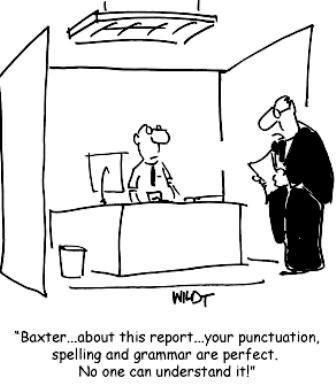|
It’s not just professors and snobs who deplore the decline of
English. The great essayist and novelist George Orwell (1903-50) had much
to say about the corruption of language—and how it enables tyranny.
The warning was clear: a distracted populace with diminished reading,
writing, and speaking skills is vulnerable.
Orwell’s 1984, published in 1949, is a demoralizing
post-World War II vision of global totalitarianism. It is set in
London—the British Isles are now part of a superstate called Oceania,
which also includes the Americas. Oceania is always at war with either of
the world’s other two superstates, Eurasia and Eastasia.
In Oceania, “the Party,” a cadre of megalomaniacal despots,
wields absolute power. This regime has destroyed society as we know it,
setting children against parents and wives against husbands, enforcing
unwavering loyalty to “Big Brother,” the potentate whose
Stalin-like countenance stares out balefully from posters no one can avoid.
One of the Party’s acknowledged goals is the end of independent
thought, which it hopes to bring about by instituting one of its pet
projects: a language called “Newspeak.” Orwell worked Newspeak
out in exhaustive detail and added an appendix at the end of 1984
titled “The Principles of Newspeak.” The brief essay describes
how the Party dumbed down standard English, or “Oldspeak,” and
mangled and perverted it into a streamlined, regimented version of English
in which complexity and nuance were impossible.
Newspeak was designed to make a heretical thought “literally
unthinkable, at least so far as thought is dependent on words.” The
Party abolished all but the most mundane, unequivocal, easy-to-say words.
Its aim was to render speech “as nearly as possible independent of
consciousness” so that communication might become “a gabbling
style of speech, at once staccato and monotonous,” allowing speakers
to “spray forth the correct opinions as automatically as a machine
gun spraying forth bullets.” And “the texture of the words,
with their harsh sound and a certain willful ugliness … assisted the
process still further.”
Newspeak encapsulates Orwell’s loathing for systems that manipulate
language to cover their tracks as they consolidate their power. Newspeak is
English disfigured to do its masters’ bidding. It’s so radical
that in 1984 the Party is implementing it in stages, targeting the
year 2050 for the transition to be complete. When Newspeak takes over,
anything imaginative or unconventional, let alone remotely subversive, will
be impossible to convey in words.
The main character in 1984 is a hapless everyman named Winston Smith. He works in the Ministry of Truth, where his job is rewriting history, expunging recorded facts that the Party finds inconvenient. One day, Winston receives an assignment (always in Newspeak): “times 3.12.83 reporting bb dayorder doubleplusungood refs unpersons rewrite fullwise upsub antefiling.” Orwell translates: “The reporting for Big Brother’s
Order for the Day in the Times of December 3rd 1983 is extremely
unsatisfactory and makes references to nonexistent persons. Rewrite it in
full and submit your draft to higher authority before filing.”
Note Newspeak’s militant minimalism: the telescoping of “Order
for the Day” into “dayorder,” plus “bb,”
“refs,” “unpersons,” “upsub” and
“antefiling.” “Fullwise” replaces “in
full” because all Newspeak adverbs end in wise.
“Doubleplusungood,” for “extremely unsatisfactory,”
is one of the new tongue’s inspired achievements in sheer
hideousness. Because Newspeak is shrinking the vocabulary, it uses
“ungood” to replace bad, awful, wrong, etc. As for “plus” and
“doubleplus,” they’re the only words available in
Newspeak for adding emphasis.
The passage in the Declaration of Independence that starts, “We hold
these truths to be self-evident,” with its references to equality,
liberty, and happiness, is literally impossible to translate into Newspeak.
“The nearest one could come to doing so,” Orwell wrote,
“would be to swallow the whole passage up in the single word crimethink.”
—Tom Stern
|
View and comment on this
article on our website.
|
|
Free BONUS Quiz for You!
[[firstname]], because you are a subscriber to the newsletter, you get access to one of the Subscribers-Only Quizzes. Click here to take an Affect vs. Effect Quiz and get your scores and explanations instantly!
We will be adding many more quizzes this year to our already substantial list of quizzes. If you have suggestions for topics we have not yet covered, please send us a message at help@grammarbook.com.
|
Hundreds of Additional Quizzes
at Your Fingertips
Subscribe now to receive hundreds of additional English usage quizzes not found anywhere else!
Teachers and Employers
Save hours of valuable time! You may assign quizzes to your students and employees and have their scores tallied, organized, and reported to you! Let GrammarBook.com take the hassle out of teaching English!
"Fun to test my skills."
"The explanations really help ... thanks!"
"I can select the quizzes to assign to my students, and then the results are reported to me automatically!"
|

|
Don't need all the quizzes?
You can now purchase the same quizzes individually for ONLY 99¢ each.
Purchase yours here. |
If you think you have found an error in a quiz, please email us at help@grammarbook.com
|
 |
The Blue Book of Grammar and Punctuation
by Jane Straus, Lester Kaufman, and Tom Stern |
The Authority on English Grammar! Eleventh Edition Now Available
An indispensable tool for busy professionals, teachers, students, homeschool families, editors, writers, and proofreaders.
Available in print AND as an e-Book! Over 2,000 copies are purchased every month!
The publisher of The Blue Book, Jossey-Bass, A Wiley brand, is offering a 35 percent discount for those of you who order the book through Wiley.com. Shipping and tax are not included. Simply go to bit.ly/1996hkA and use discount code E9X4A.
Offer expires December 31, 2018.
|
Wordplay

|
 |
English In A Snap:
68 One-Minute English Usage Videos FREE |
Learn all about who and whom, affect and effect, subjects and verbs, adjectives and adverbs, commas, semicolons, quotation marks, and much more by just sitting back and enjoying these easy-to-follow lessons. Tell your colleagues (and boss), children, teachers, and friends. Click here to watch.
|
|





